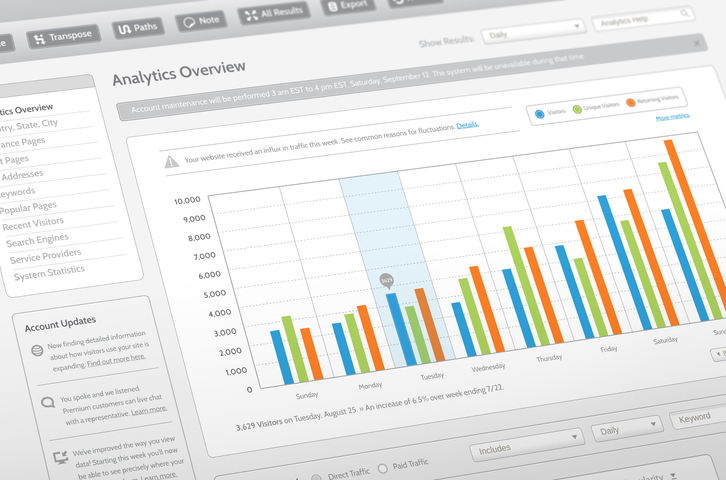94% of consumers say they’re more likely to trust a business with a strong online presence. This is even more critical in the boat and yacht charter industry, where customers want a seamless booking experience, visually stunning websites, and trustworthy services. If your online presence isn’t optimized, you’re missing out on countless potential bookings.
In an industry driven by dreams of sun-soaked adventures and water based travel, SEO is the tool that turns those dreams into qualified clients. A well-optimized website not only drives traffic but also establishes credibility, improves user experience, and keeps you ahead of competitors.
Our team at Aquatic SEO have put together this checklist, as your ultimate guide to optimizing your website for search engines, tailored specifically to the marine industry. From attracting new customers to ensuring your site performs flawlessly, we’ll cover every detail. Ready to take the helm of your digital success? Let’s dive in.

1. SEO Basics Checklist: The Foundation of Your Strategy
Every successful SEO strategy begins with the basics. These fundamental steps ensure that your website is visible to search engines and provides a user-friendly experience for visitors. Without these essentials, even the most beautifully designed website can remain invisible.
Why It Matters:
- Google Search Console (GSC) and Bing Webmaster Tools provide insights into how your site performs on search engines.
- These tools highlight areas for improvement, such as fixing crawl errors or optimizing mobile usability.
- For many marine based businesses, where customers often search on mobile devices, foundational SEO ensures your site is discoverable.
Key Factors:
- Set Up Google Search Console and Bing Webmaster Tools
- Why: These tools help monitor search performance, identify issues, and optimize rankings.
- Example: Use GSC to check which keywords like “dock slip leasing Miami” drive traffic to your site.
- Install Google Analytics
- Why: Understand how users interact with your site, from which pages perform best to drop-off points.
- Example: Analyze if visitors spend more time on “Fleet Overview” or “Destination Tours” pages to optimize content accordingly for a luxury yacht charter company.
- Install an SEO Plugin for WordPress
- Why: Plugins like Yoast or Rank Math simplify metadata optimization and sitemap updates.
- Example: Use Rank Math’s schema markup feature to highlight your fleet listings in search results.
- Create and Submit a Sitemap
- Why: Helps search engines crawl and index your site efficiently.
- Example: Ensure your sitemap includes vital landing pages that showcase your services/products.
- Optimize Robots.txt File
- Why: Direct search engines on which pages to crawl or avoid.
- Example: Exclude admin or duplicate pages to focus crawl budget on essential pages.

2. Keyword Research Checklist: Targeting the Right Audience
Keywords are the foundation of SEO. They act as a map, guiding your ideal customers to your website. For marine based businesses, choosing the right keywords can mean the difference between being fully booked and struggling to fill slots.
Why It Matters:
- Targeting high-intent keywords ensures you attract visitors ready to book.
- Focusing on long-tail keywords helps you rank for niche queries and connect with customers searching for specific experiences.
Key Factors:
- Identify High-Intent Keywords
- Examples:
- “Deep sea fishing charters Key West.”
- “USCG Captain licensing San Diego.”
- Pro Tip: Use tools like Google Keyword Planner to find keywords with high search volume and commercial intent.
- Find Long-Tail Keywords
- Examples:
- “Rescue diver course in Hawaii.”
- “Catamaran rental with crew San Francisco.”
- Why It Works: These terms often convert better because they address specific user needs.
- Analyze Competitor Keywords
- How: Use Semrush or Ahrefs to identify the top-performing keywords of your competitors.
- Example: If a competitor ranks for “sunset yacht charters Charleston,” create content targeting this keyword with better visuals or unique packages.
- Leverage Online Communities
- How: Monitor forums like TripAdvisor or Reddit for trending topics.
- Example: If users ask, “What’s included on a 5-day luxury cruise?” create a detailed FAQ page to address it.
- Utilize Question-Based Keywords
- Tool: Use Answer the Public to find common questions.
- Example: Write blogs like “5 Tips for Finding the Perfect Marine Insurance Providers” or “How to Choose the Best Yacht Rental in St Thomas, USVI.”
3. On-Page SEO Checklist: Optimizing Your Content
On-page SEO is about aligning every element on your website with user intent and search engine guidelines. This is where you ensure your content is optimized, readable, and conversion-focused.
Why It Matters:
- Search engines rank individual pages, not entire websites. Optimizing each page increases the chances of ranking for relevant searches.
Key Factors:
- Optimize URLs
- Why: Clean, keyword-rich URLs improve click-through rates.
- Example: Use /luxury-yacht-charters-miami/ instead of /page123.html.
- Enhance Meta Titles and Descriptions
- Why: Meta descriptions influence click-through rates.
- Example: “Book your private yacht charter in Miami. Luxury, comfort, and adventure await!”
- Use Header Tags Strategically
- Why: Headers improve readability and signal hierarchy to search engines.
- Example: H1: “Luxury Yacht Rentals in Miami” H2: “Why Choose Our Yachts?” H3: “Features of Our Fleet.”
- Include Internal and External Links
- Why: Internal links improve navigation; external links build credibility.
- Example: Link to your “Fleet” page and an authoritative source like NOAA for marine safety tips.
- Optimize Images
- Why: Proper alt text improves accessibility and SEO.
- Example: Alt text: “45-foot luxury yacht with sun deck and lounge area.”

4. Content Checklist: Engaging and Informative Content
Content is the anchor of your SEO strategy. In the marine industry, it’s about more than just words—it’s about inspiring dreams and driving bookings.
Why It Matters:
- High-quality content attracts visitors, builds trust, and converts leads into customers.
Key Factors:
- Create In-Depth Service/Product Descriptions
- Example: “Our marina offers secure dockage, fuel services, and on-site maintenance.”
- Write Destination Guides
- Example: “Top 5 Hidden Coves to Explore in the Florida Keys by Boat.”
- Address FAQs
- Example: “What’s the difference between a private charter and a shared boat rental?”
- Use Multimedia
- Example: Add virtual tours where applicable or video testimonials from past clients.
- Publish Blogs Regularly
- Why: Fresh content keeps your site relevant.
- Example: Seasonal topics like “Winterizing Your Yacht Tips” or “Spring Break Luxury Bareboat Rentals.”
5. Technical SEO Checklist: Ensuring Smooth Sailing
Technical SEO focuses on the backend elements of your site that influence its performance and crawlability. A technically sound website offers a seamless experience for users and search engines alike.
Why It Matters:
- Poor technical SEO can hurt rankings, even if your content is stellar.
Key Factors:
- Ensure Mobile-Friendliness
- Why: Over 60% of users search on mobile devices.
- Tool: Use Google’s Mobile-Friendly Test.
- Fix Broken Links
- Why: Broken links frustrate users and waste crawl budget.
- Tool: Screaming Frog or Ahrefs for link audits.
- Secure Your Site with HTTPS
- Why: Builds user trust and is a Google ranking factor.
- Optimize Page Load Speed
- Why: Faster sites reduce bounce rates.
- Tool: Use PageSpeed Insights to identify areas for improvement.
- Use Schema Markup
- Why: Improves visibility in search results with rich snippets.
- Example: Add structured data for reviews or “Book Now” features.

6. Link Building Checklist: Building Authority
Backlinks are among the most important ranking factors. For the marine industry, they’re an opportunity to establish authority and expand your reach.
Why It Matters:
- Quality backlinks signal trust and relevance to search engines.
Key Factors:
- Collaborate with Tourism Blogs
- Example: Partner with a travel blogger to feature your yacht charter experience.
- List Your Business on Directories
- Examples: Boatsetter, Click&Boat, TripAdvisor, etc.
- Encourage Reviews and Testimonials
- Example: Ask satisfied customers to leave Google reviews with links to your site.
- Participate in Local Events and Sponsorships
- Why: Building relationships within the community can lead to valuable backlinks.
- Examples: Sponsor a local regatta or participate in a marine expo to gain mentions and links from event websites.
- Leverage Unlinked Brand Mentions
- Why: If someone mentions your company but doesn’t link to your site, you’re missing a backlink opportunity.
- Example: Use tools like Ahrefs or Mention to identify unlinked mentions of your business and reach out to request a link.
7. Local SEO Checklist: Anchoring Your Business in Local Searches
For marine businesses, local SEO is critical. Customers are often searching for services in specific destinations, making it essential for your business to dominate local search results.
Why It Matters:
- Over 70% of users who perform a local search visit a business within five miles.
- Appearing in Google’s Local Pack can dramatically increase visibility.
Key Factors:
- Claim and Optimize Your Google Business Profile
- Why: Ensures your business appears in local searches and Google Maps.
- Example: Add details like your service area, photos of your fleet, and customer reviews.
- Include Local Keywords in Your Content
- Examples:
- “Best yacht brokers in Fort Lauderdale.”
- “Fishing boat rentals near Key West.”
- List Your Business in Local Directories
- Examples: Florida By Water, Boatsetter, and local chamber of commerce websites.
- Encourage Positive Reviews
- Why: Reviews impact both rankings and customer trust.
- Example: Offer incentives for clients to leave reviews, like discounts on future charters.
- Optimize for Voice Search
- Why: Voice searches often have local intent.
- Example: Target questions like “Where can I book a luxury yacht charter near me?”

8. Measuring and Monitoring Success
SEO is not a set-it-and-forget-it strategy. To achieve sustained success, you need to track your progress and adjust your tactics based on data.
Why It Matters:
- Measuring key metrics ensures your efforts translate into actual results like increased bookings.
- Regular monitoring helps you adapt to changes in search algorithms and customer behavior.
Key Factors:
- Track Website Traffic and Conversions
- Tools: Use Google Analytics and Google Search Console.
- Example: Monitor whether traffic from keywords leads to completed booking forms.
- Analyze Rankings and Keyword Performance
- Tools: Use Ahrefs or Semrush to track changes in rankings for target keywords.
- Monitor Bounce Rates and Dwell Time
- Why: High bounce rates may indicate poor user experience or irrelevant content.
- Example: If visitors leave quickly after landing on your pricing page, consider revising the content to make it more engaging.
- Review Backlink Growth
- Tools: Use Majestic or Ahrefs to monitor new backlinks.
- Example: Track which referral sources drive the most traffic to your site.
- Set Up Regular SEO Audits
- Why: Ensures your site remains optimized as it grows.
- Tools: Screaming Frog or Semrush for detailed audits.
9. Advanced SEO Tips for the Boat and Yacht Charter Industry
To truly stand out in this competitive industry, you need to go beyond the basics. Advanced strategies can help you capture niche markets and enhance your overall online presence.
Why It Matters:
- Differentiating your business with innovative SEO tactics can give you a competitive edge.
Key Factors:
- Leverage Visual Content for SEO
- Example: Create immersive videos or 360-degree virtual tours of your fleet and optimize them for YouTube and Google search.
- Utilize Schema Markup for Rich Results
- Why: Enhances your appearance in search results.
- Example: Add structured data for your yacht listings to show availability, amenities, and pricing directly in search results.
- Create Niche Landing Pages
- Examples: Pages targeting specific customer groups searching for specific services/products
- Launch Seasonal Campaigns
- Why: Capitalize on seasonal demand.
- Example: “Book Your Winter Yacht Charter in Miami – Limited Availability!”
- Incorporate Customer-Generated Content
- Why: Builds trust and engagement.
- Example: Feature photos or testimonials from happy clients on your website and social media.

Chart Your Path to SEO Success
In the fast-paced world of boat and yacht charters, SEO is your compass to staying ahead of the competition. By implementing this comprehensive checklist, you’ll not only increase your online visibility but also create a seamless and engaging experience for your customers.
At Aquatic SEO, we specialize in crafting tailor-made digital marketing strategies for businesses in the marine industry. From optimizing your website to running highly targeted PPC campaigns, we know the waters of digital marketing better than anyone.
Ready to make waves with your online presence? Contact us today for a free consultation and let’s navigate your business to success.






